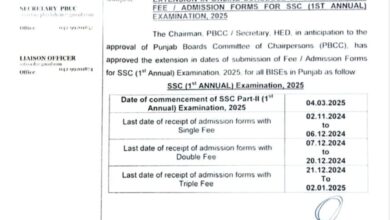Special Family Pension, Ordinary Family Pension, Voluntary Retirement Penalties in Pakistan
Contents
Special Family Pension, Ordinary Family Pension, Voluntary Retirement Penalties in Pakistan

Introduction
Ordinary Family Pension (OFP) is a financial benefit provided to the family members of a deceased or ineligible government employee. It is designed to offer financial support during difficult times. The Government of Pakistan has recently revised the OFP rules to extend the eligibility period and provide greater benefits to certain family members.
Key Points
- Eligibility: The OFP is available to the spouse, children, or dependent parents of the deceased or ineligible employee.
- Duration: The maximum duration of the OFP has been extended to 10 years.
- Special Cases:
- Disabled Children: The OFP will continue for the lifetime of disabled or special children.
- Children: The OFP will continue until the age of 21 or for 10 years, whichever is later.
- Amendment: The existing instructions on OFP have been amended to reflect these changes.
Table: Eligibility Criteria for Ordinary Family Pension
| Family Member | Eligibility Conditions |
|---|---|
| Spouse | Must be legally married to the deceased employee. |
| Children | Must be unmarried and under 21 years of age, or disabled. |
| Dependent Parents | Must be dependent on the deceased employee for financial support. |
FAQs
- What happens if the spouse remarries? The OFP will cease upon remarriage.
- Can I receive the OFP if I am already receiving a pension from another source? Yes, you can receive the OFP in addition to other pensions.
- How is the OFP calculated? The OFP is calculated based on the deceased employee’s last drawn salary.
- What documents are required to apply for the OFP? You will need to provide proof of marriage, birth certificates, death certificate, and other relevant documents.
Conclusion
The recent amendments to the OFP rules have significantly improved the benefits available to the families of deceased or ineligible government employees. By extending the eligibility period and providing additional support for disabled children, the government has ensured that families in need receive the financial assistance they require.

Special Family Pension: A Comprehensive Guide
Introduction
The Government of Pakistan, through its Finance Division, has recently announced significant changes to the Special Family Pension scheme. These changes aim to provide greater financial security to the families of deceased or ineligible pensioners. This article delves into the key aspects of the revised Special Family Pension scheme, including eligibility criteria, rate of pension, and other relevant details.
Key Changes to Special Family Pension
- Extended Admissibility Period: The Special Family Pension will now be admissible to remaining entitled family members for 25 years after the death or ineligibility of the spouse/first recipient.
- Lifetime Pension for Disabled Children: In cases where a pensioner has disabled or special children, the Special Family Pension will remain admissible for the lifetime of such children.
- Enhanced Pension Rate: The rate of Special Family Pension for eligible recipients has been increased to 50% of the last drawn pension admissible to the first recipient, applicable to all ranks of Armed Forces/Civil Armed Forces without any minimum or maximum limits.
Eligibility Criteria
To be eligible for Special Family Pension, the following conditions must be met:
- Relationship: The claimant must be a spouse, first recipient, or entitled family member of the deceased pensioner.
- Time Period: The Special Family Pension will be admissible for 25 years after the death or ineligibility of the spouse/first recipient, unless the claimant is a disabled or special child of the pensioner.
- Disability: In the case of disabled or special children, the Special Family Pension will remain admissible for their lifetime.
Rate of Special Family Pension
The rate of Special Family Pension is now 50% of the last drawn pension admissible to the first recipient. This rate is applicable to all ranks of Armed Forces/Civil Armed Forces without any minimum or maximum limits.
Transferability of Pension
The Special Family Pension is transferable to all eligible heirs as per the order prescribed in Rule 12 of Pension Regulations Vol-I (Armed Forces), 2010.
FAQs
Q: What is the purpose of Special Family Pension? A: Special Family Pension is a financial benefit provided to the families of deceased or ineligible pensioners.
Q: Who is eligible for Special Family Pension? A: Spouses, first recipients, and entitled family members of deceased pensioners are eligible for Special Family Pension.
Q: How long is Special Family Pension admissible? A: The Special Family Pension is admissible for 25 years after the death or ineligibility of the spouse/first recipient, unless the claimant is a disabled or special child.
Q: What is the rate of Special Family Pension? A: The rate of Special Family Pension is 50% of the last drawn pension admissible to the first recipient.
Q: Is Special Family Pension transferable? A: Yes, Special Family Pension is transferable to all eligible heirs.
Conclusion
The revised Special Family Pension scheme represents a significant improvement in the financial security provided to the families of deceased or ineligible pensioners. The extended admissibility period, enhanced pension rate, and provision for lifetime pension for disabled children are all positive developments that will benefit many families. By understanding the key aspects of this scheme, eligible individuals can take advantage of the financial support it offers.

Voluntary Retirement Penalties in Pakistan: A Breakdown
Introduction
The Government of Pakistan, through its Finance Division, has recently introduced penalties for voluntary retirement from government service. These penalties aim to discourage early retirement and ensure that employees serve for a minimum period before opting out.
Key Points
- Penalty Structure: A Federal Government employee who retires voluntarily after 25 years of service will face a flat reduction in their gross pension. This reduction rate is 3% per year for each completed month between the retirement date and the superannuation date. However, the maximum reduction is capped at 20%.
- Armed Forces and Civil Armed Forces: Voluntary retirement penalties will only apply to personnel in the Armed Forces and Civil Armed Forces if retirement is sought or granted before reaching the prescribed Rank Service.
- Existing Instructions Amended: The new penalties supersede any previous instructions on voluntary retirement, effective immediately.
Table: Voluntary Retirement Penalty Rates
| Years of Service | Penalty Rate |
|---|---|
| 25-26 | 3% |
| 26-27 | 6% |
| 27-28 | 9% |
| 28-29 | 12% |
| 29-30 | 15% |
| 30-31 | 18% |
| 31+ | 20% |
FAQs
- What is the purpose of these penalties? The penalties are intended to discourage early retirement and ensure that employees serve for a minimum period before retiring.
- Do these penalties apply to all government employees? No, these penalties only apply to Federal Government employees.
- Are there any exceptions to these penalties? Yes, the penalties do not apply to personnel in the Armed Forces and Civil Armed Forces if retirement is sought or granted before reaching the prescribed Rank Service.
- How is the penalty calculated? The penalty is calculated as a flat reduction in the employee’s gross pension based on the number of completed months between the retirement date and the superannuation date. The maximum reduction is capped at 20%.
Conclusion
The introduction of voluntary retirement penalties in Pakistan marks a significant change in government retirement policies. These penalties aim to address the issue of early retirement and ensure that employees contribute to the government for a substantial period. While the penalties may have an impact on the retirement plans of some employees, they are intended to promote long-term service and stability within the government.









